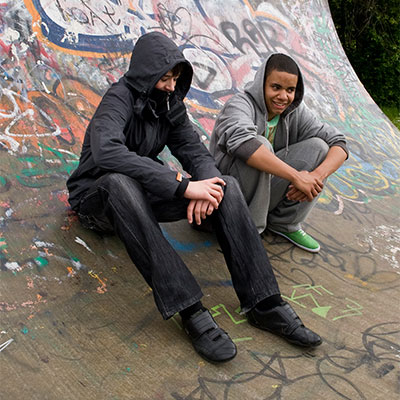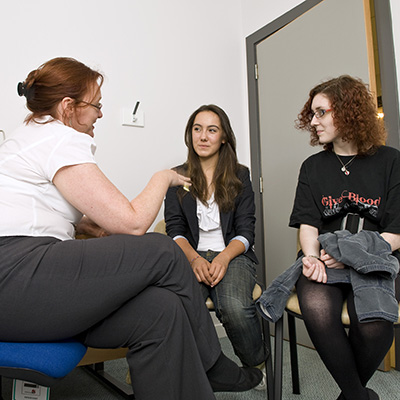- Transition ends when your child:
- Knows and understands all about their asthma and triggers.
- Knows and understands all about their treatments.
- Knows and understands when their asthma is getting worse.
- Thinks they are ready to go to clinic on their own.
- When they can manage their own asthma.
- When their asthma care is the responsibility of the adult asthma team.
Author Archives: Jackie Aim
Working together
- Asthma management needs a team approach.
- Teenagers can’t manage their asthma without their parents right away, it takes time.
- Parents can’t make their teenager take medication into their body.
- Good asthma control is not hard to achieve, but everyone needs to work together, teenagers, parents and your asthma team.
- Knowing how to do your bit and understanding what the rest of your team is doing is vital.
Parents and transition
- Parents will naturally be anxious.
- You have managed your child’s asthma well for years.
- Can be a frustrating time.
- You might get angry at your teenager’s attitude to asthma.
- Parents need support to let go.
- There should be a gradual handover of responsibility.
- Parents still have a legal responsibility until your child is 16 years old.
- Parents are still needed, but in a different role.
Smoking

© Crown copyright
Your healthcare team should ask about smoking
- Is the teenager an active smoker?
- Passive? Are they exposed to their friends smoke?
- Family? Are they exposed to smoke at home?
- Do they like smoking?
- Discuss with them what the effect of smoking has on asthmatic lungs.
- Discuss how smoking can reduce the effect inhaled medicine.
- Smoking Cessation advice should be given both for the teenager and their family.
For more about smoking see the topic on ‘Smoking and risky behaviour‘.
Careers with asthma
Baker
Timber worker
Spray painter
Chemical worker
Armed forces
Animal handler
- Your team should discuss your child’s career hopes early on (age 12 – 14 at latest).
- You should have realistic discussions. Some jobs may make asthma worse e.g. exposure to dust, chemicals or animals.
- Entry to the Armed forces is limited to those with no asthma symptoms for at least 4 years.
What happens in transition clinic?

© Crown copyright 2009
- The children’s doctor will write to the adult doctor to tell them about your child and their asthma.
- You will go to the adult clinic and see the doctors and nurses there. Sometimes the children’s doctor and nurse see you there too. This might be in a different hospital.
- Your child can still bring parents/carers or a friend with them to the clinic. If they prefer they can go to clinic on their own.
- The team start the consultation with young person.
- Careful explanation and discussion needed with young person and parent.
- May take several attempts.
- They build up confidence, independence and consultation skills.
- Honest and unbiased young person’s perspective.
- Parents can join the review to summarise and discuss their observations.
- Everyone should agree on the next steps.
How do I get my child ready for transition?

© Crown copyright 2009
- The children’s doctor and nurse will help you and your child get ready for transition clinic. This way of working is recommended in the British Thoracic Society / Scottish Intercollegiate Guidelines Network (SIGN) guideline 158: British Guideline on Management of Asthma [pdf].
- They will help them to learn about their asthma and triggers.
- They will help them learn about the medicines and inhalers that they take.
- You and your child can ask any questions you have about their asthma.
- Your child can go into part of the clinic by themselves to increase confidence. Your healthcare team should give young people the opportunity to be seen alone from 12 years old.
- Teenagers usually still need their parents to help them arrange their appointment, get them there and help arrange their prescriptions.
When does asthma transition start?

Birthday cake
Every child is different. Children will all be ready to transition at different times, but most clinics usually start the process when the child is around the age of 12.
- When the child is old enough and when they feel ready.
- When your doctor or nurse think they may be ready.
- The healthcare team are aiming to make the transition as easy as possible for your child.
Why does my child have to go to a transition clinic?

© Crown copyright 2014
- This will help prepare you and your child for going to adult clinic by themselves.
- It will help your child understand about their asthma as they get older.
- It will help them to understand their asthma treatments.
- It will help them to become more in control of their asthma.
- It might take a year or more to be ready to fully transfer.
When does transition start?

© Crown copyright 2009
- Your child goes through many transitions or changes throughout their life time.
- Moving on from primary to secondary school.
- Transition from parents or carers doing everything for them, to doing some things by themselves.
- Transition from being told what to do, to learning to make their own decisions.
- Your child will need help and guidance with changes as they get older.






